| Srl | Item |
| 1 |
ID:
139777
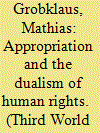

|
|
|
|
|
| Summary/Abstract |
This paper conceptualises appropriation as an analytical tool to capture the contradictory nature of human rights localisation. Here appropriation is understood as the intentional reinterpretation of ideas across cultural, spatial and temporal contexts aimed at definitional power. In the first part of the paper I lay out the concept and develop an operationalisation. In the second part I apply the framework to the case of contested gender reform in Nigeria. The analysis highlights the localisation of human rights norms as an amalgam of different competing appropriating acts, leading to a hybrid and contradictory outcome that bears both transformative and stabilising potential.
|
|
|
|
|
|
|
|
|
|
|
|
|
|
|
|
| 2 |
ID:
173918
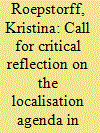

|
|
|
|
|
| Summary/Abstract |
Calls for a greater inclusion of local actors have featured for some time in debates on how to make humanitarian action more efficient and address unequal power relations within the humanitarian system. Though the localisation agenda is at the core of current reform efforts in the humanitarian sector, the debate lacks a critical discussion of underlying assumptions – most strikingly, the very conceptualisation of the local itself. It is argued that the current discourse is dominated by a problematic conceptualisation of the local in binary opposition to the international, leading to blind spots in the analysis of exclusionary practices of the humanitarian sector. As such the localisation agenda risks perpetuating the very issues it wants to redress. A critical localism is thus proposed as a framework for much needed research on the localisation agenda.
|
|
|
|
|
|
|
|
|
|
|
|
|
|
|
|
| 3 |
ID:
139231
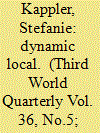

|
|
|
|
|
| Summary/Abstract |
This article challenges the notion of the ‘local’ as a static identity or set position and argues for a processual understanding of localisation, in which constant processes of delocalisation and (re-)localisation serve as tools by which peacebuilding actors position themselves in the political economy and the social landscape of peacebuilding. Peacebuilding agency and -identity are viewed as situated in time and space and subject to constant transformation. Using the cases of Bosnia-Herzegovina and Cyprus, I argue that the positionality of local identity is contingent on the ever-changing social context and political economy of peacebuilding. By viewing processes of (re-)localisation and delocalisation as markers of agency, we can overcome the binary between local and international and investigate more subtle forms of agency in a fluid peacebuilding environment. The article identifies the ways in which peacebuilding agency facilitates the creation of a particular set of identities (identification), before investigating the processes of delocalisation and (re-)localisation in detail. The article goes on to argue that, rather than being mutually exclusive, these two processes tend to happen in parallel and thus challenge the seemingly neat binary between local and international peacebuilding identities.
|
|
|
|
|
|
|
|
|
|
|
|
|
|
|
|
| 4 |
ID:
138455
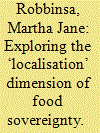

|
|
|
|
|
| Summary/Abstract |
The ‘localisation’ narrative is at the heart of food sovereignty in theory and practice, in reaction to the ‘distance’ dimension in the dominant industrial food system. But while it is a central element in food sovereignty, it is under-theorised and largely unproblematised. Using the theoretical concepts of food regime analysis, uneven geographical development and metabolic rift, the author presents an
exploratory discussion on the localisation dimension of food sovereignty, arguing that not all local food systems are a manifestation of food sovereignty nor do they all help build the alternative model that food sovereignty proposes. The paper differentiates local food systems by examining character, method and scale and illustrates how local food systems rarely meet the ideal type of either food sovereignty or the capitalist industrial model. In order to address five forms of distance inherent in the global industrial food system, localization is a necessary but not sufficient condition for food sovereignty. A more comprehensive food sovereignty needs to be constructed and may still be constrained by the context of capitalism and mediated by the social movements whence it comes.
|
|
|
|
|
|
|
|
|
|
|
|
|
|
|
|
| 5 |
ID:
137634
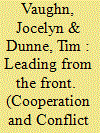

|
|
|
|
|
| Summary/Abstract |
The United States has historically been inconsistent and ambivalent about the responsibility to protect. Part 1 of the article sets out a theoretical framework for understanding how the United States aligns itself with the responsibility to protect; it does so by initially using the idea of norm localisation, which reveals important convergences and tensions between the international norm and the localised variant that we call ‘genocide and mass atrocity prevention/protection’. Part 2 looks at the impact of this norm innovation in relation to the position that the United States government adopted on Libya – suggesting that it played a critical leadership role in the crisis and in doing so took risks with its international reputation while knowing that there was little prospect that this action would be warmly greeted by Congress or domestic public opinion.
|
|
|
|
|
|
|
|
|
|
|
|
|
|
|
|
| 6 |
ID:
162408


|
|
|
|
|
| Summary/Abstract |
Mafraq, a Jordanian border town, has been profoundly reshaped by the influx of Syrian refugees since 2011. As aid agencies were initially absent from the humanitarian response, the gap was filled by faith-based organisations. In an academic and policy environment narrowly focused on security issues, Islamic charities have received considerable attention. However, little is known about the activities of Evangelical groups, let alone Arab Evangelicals, and how giving aid becomes embedded in wider religiopolitical projects. This article explores how the Mafraq Unity Church, an indigenous Evangelical congregation, balances its religious identity with an increasingly professionalised NGO ‘business’. Drawing on fourteen months of ethnographic fieldwork in 2016/17, I argue that through tapping into resources from secular and non-secular transnational networks, the church appeals to two ‘international communities’: the aid industry and Evangelical communities worldwide. The church's rootedness in northern Jordan speaks to the humanitarian sector's recent ‘localization of aid’ agenda, while its benevolent activities are also framed as part of worldwide Evangelism. This allows Jordanian church officials to rhetorically shift Evangelism's centre of gravity to the Global South and move Mafraq closer to the demographic and historical centre of Christianity.
|
|
|
|
|
|
|
|
|
|
|
|
|
|
|
|